Technological innovation always presents new challenges in any industry and advances in artificial intelligence and content marketing are no different.
Self-teaching algorithms have made SEO more abstract and difficult to master. Which means it can feel harder to rank, attract an audience, and ultimately gain customers with content marketing.

However, while innovation brings challenges, it also brings great opportunities for those ready to evolve with the times and learn how to harness the new technology.
I'm going to show you how AI will shape the future of content marketing to make it even more effective as well as some ways it should already be shaping your strategy today.
But first, you need to understand how artificial intelligence is shaping the SEO landscape…
Learn More: 11 Digital Marketing Trends You Can No Longer Ignore in 2018
Search Engines Are Developing Minds Of Their OwnFor decades, Google (and its competitors) based its ranking on rule-based logic. Granted, it was very complex rule-based logic, but at the end of the day, it was hardcoded rules. This meant that an SEO expert's primary job was to find and exploit the rules.
There were keyword hacks, then backlinking hacks, and so on. But not all these exploits were bad. For example, if you can create content that generates a lot of legitimate, authoritative backlinks, you're probably creating valuable content that readers want to see.
That's why for years, Matt Cutts was Google's key SEO spokesperson. Between his online videos and public speaking engagements, he would explain how Google's algorithm and updates worked for marketers so that they could create websites and content that lined up with the way Google wanted it.
But in the early 2010s that started to slow down and in 2014, he took leave from Google. The SEO world was shocked and worried. Who would explain all this complicated black magic to us? Then it got worse — in 2015 Google announced that his replacement wouldn't be a public persona. This was the beginning of the end of an era of (moderate) transparency from the search king.
They still make major announcements, like the switch to mobile-first indexing. But otherwise, they're pretty tight-lipped about their algorithm updates now (which happen about 3 times every day). And to be fair, some insiders at Google have even admitted that they aren't entirely sure what RankBrain (a key element in its algorithm) is doing to generate results anymore.
This means that SEO has become even more of an art than a science.
Free Bonus Download: Get your free 21-point on-page SEO checklist to help increase traffic and skyrocket your rankings! Click here to download it for free right now!And Google isn't the only one. Since 2013, organic reach on Facebook Pages has been plummeting. Way back in 2014, Ogilvy was warning major brands that they should expect this metric to trend toward zero:

But this is actually a golden opportunity for marketers.
The aim of all these investments in artificial intelligence and machine learning is ultimately to provide a better user experience and happier customers.
As marketers, don't we want the same thing? As these platforms become more effective, you can expect the results they drive to match. Features like private (formerly "personal") search results will drive more qualified traffic to the right places:

Instead of creating content with mass appeal for the sake of better search ranking, you'll be able to create content that speaks directly to your audience.
Let's take a look at how AI is being used to create better content, develop better strategy, and leverage dynamic hyper-personalization (and where it's going next).
AI Will Create Better ContentBased on a survey of over 350 AI experts last year:
In fact, two years ago Gartner predicted that by this year (2018), "20% of all business content will be authored by machines."
The Associated Press has been publishing thousands of pieces of completely automated stories since 2015.
If you're skeptical that computers can't really write effective content that plays to the reader's emotions, you'd be right. We're not quite there yet. The best content is still written, at least in part, by humans.
But AI-assisted content creation is very powerful and very real.
You might not realize it, but many of the tools you're using are already built on fundamental AI technology like Machine Learning or Natural Language Processing (NLP). People are developing tools that can help writers fact-check their work to speed up the research process and reduce the chances of making an offensive or embarrassing error.
I use Grammarly on every piece I write to help catch more obscure homophones (two words that sound the same but have different meanings and spelling, like "knew" and "new") and language conventions that my spell checker won't catch and editors don't want to deal with.

Companies like CoSchedule have created tools that analyze and break down your headlines to provide actionable insights that will increase your click-through rate:

One of my favorite tools for content marketing is Clearscope. It analyzes the top 30 results on Google for any keyword and then gives you actionable advice on how to write content that can compete with them:

For example, it analyzes other common keywords that appear in those articles so that you can work them into your piece:

This is critical because Google's algorithm is now much more focused on search intent, not keyword match. In fact, you can even rank for keywords that aren't found in your article if you satisfy the intent of that query.
All of this is possible because of advances in AI technology like machine learning and NLP.
Learn More: How Artificial Intelligence Is Revolutionizing the Digital Marketing Sphere
AI Will Help Develop Better Content StrategyOne of the biggest challenges of content marketing is answering critical questions like these:
The traditional strategy is to develop buyer person, but artificial intelligence promises to answer these questions better than ever before. By analyzing website traffic, email interactions, and social media behavior, AI helps you develop a more detailed profile of your target audience and what they like.
One popular brand that uses this technology already is Fender Guitar, which works with Crimson Hexagon to provide AI-powered customer insights. After analyzing their current audience, they found that it skewed heavily toward men and explained why they were having a trouble connecting with female customers.
The traditional solution would be to having a big meeting, create customer profiles and make assumptions about what female guitarists wanted. And if the marketing team decided to invest a little more, they could interview some female guitarist and ask them directly what would want. But unless you interviewed thousands, you'd have to hope that the few women you questioned represented the diverse national market.
Besides, people are notoriously bad at explaining why they make decisions.
But by using Crimson Hexagon, Fender Guitar was able to skip based these sloppy techniques that rely on assumptions, self-reporting and hope. Their platform allows you to actually analyze what people are saying and doing online.
For example, they found that bassist Nik West was popular among their target female audience. So when they found this video of her jamming out on a Fender guitar, they paid a little bit of money to boost it on Facebook so that more potential customers would see it.
When that brand image marketing seemed to work, they expanded their relationship with the artist and started creating more promotional material by having her sample and showcase their products:
Free Bonus Download: Get your free 21-point on-page SEO checklist to help increase traffic and skyrocket your rankings! Click here to download it for free right now! AI Will Improve Attribution AnalysisA problem for content marketers is measuring the impact of content that is key further up the funnel.
Most conversion reporting is done on a last-touch basis, which gives all the credit for a conversion to the most recent click or source of that traffic.

But most customer journeys aren't so simple. Customers need to interact with your brand more than once before they are ready to buy:
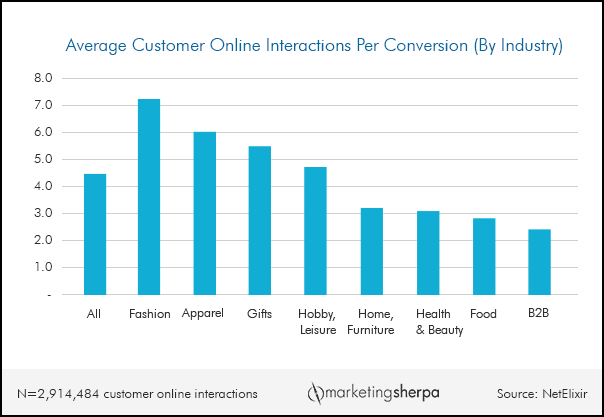
An effective content strategy is designed around this by developing pieces based on questions that customers will be asking as they move through different stages if the marketing funnel:
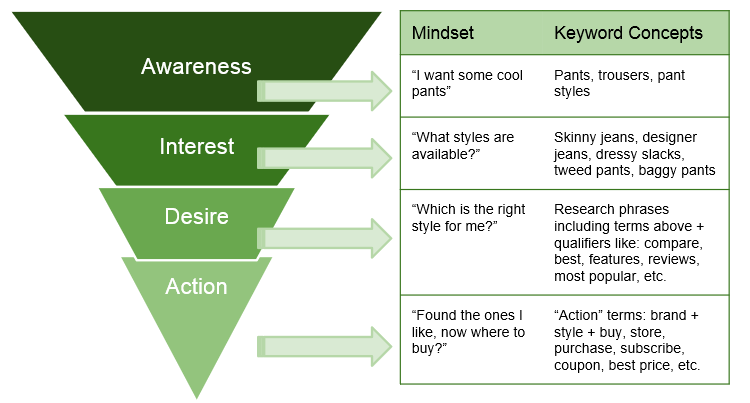
We can mitigate this issue by using more sophisticated attribution models:
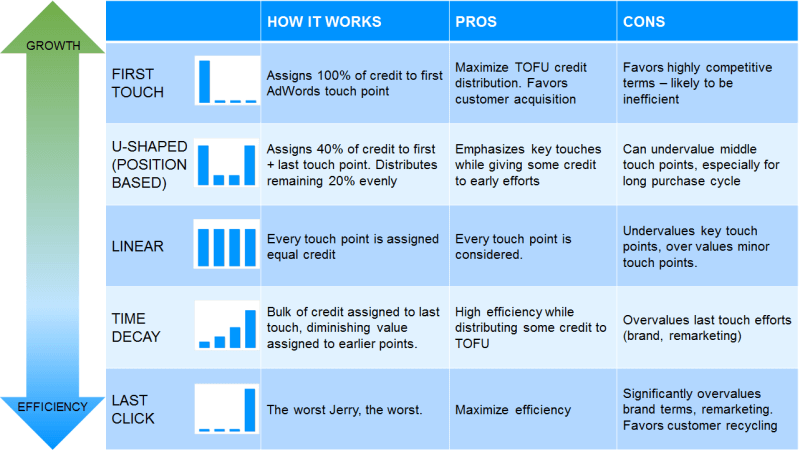
But there is still significant room for improvement. Tools like Google Attribution are addressing the problem by connecting all your channels into one unified data set to analyze more effectively.
And companies like Demand Jump are taking this even further by developing algorithmic attribution models that analyze customer behavior to determine what content is driving them through each phase to eventual conversion.
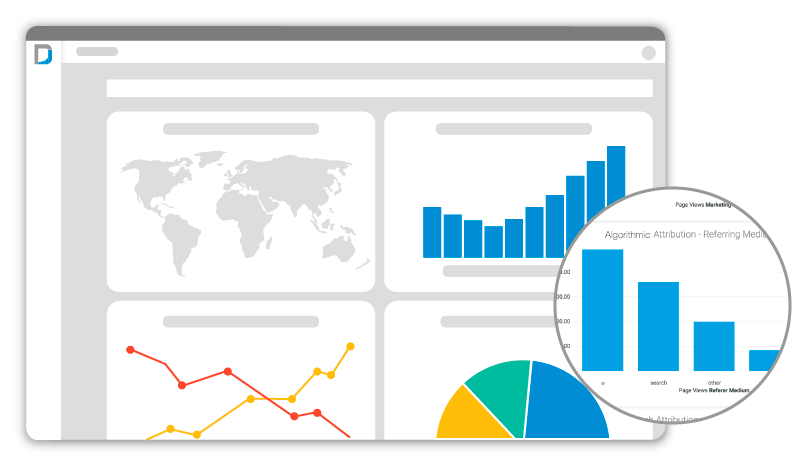
Learn More: How to Use Predictive Analytics for Better Marketing Performance
AI Will Bring Dynamic Hyper-PersonalizationWith Google's and Facebook's algorithms leaning heavier toward personalized, targeted content that is highly relevant to the user, marketers need to up their efforts to deliver hyper-personalized content and recommendations.
With a better understanding of your audience and prescriptive attribution, you'll know what content moves customers from one phase to the next. You can use this information to offer more relevant content upgrades and recommendations:

E-commerce companies like Amazon are already using machine learning like this to drive better product recommendations and increase sales through cross-selling:

Marketers ranked this type of targeted content delivery as the most substantial impact that AI will have on marketing:
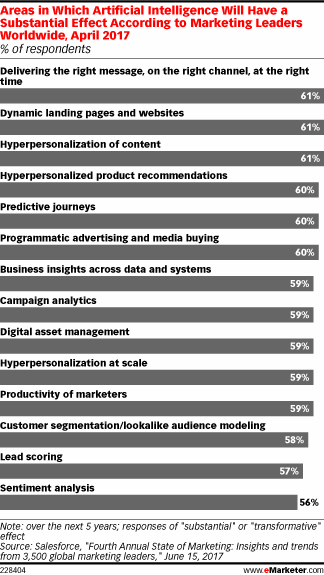
Right alongside that is "dynamic landing pages and websites" and "hyperpersonalization of content."
Dynamic landing pages have been in use for a while now, based on segmentation data, just like email segmentation. For example, let's look at two different landing pages on Hubspot:
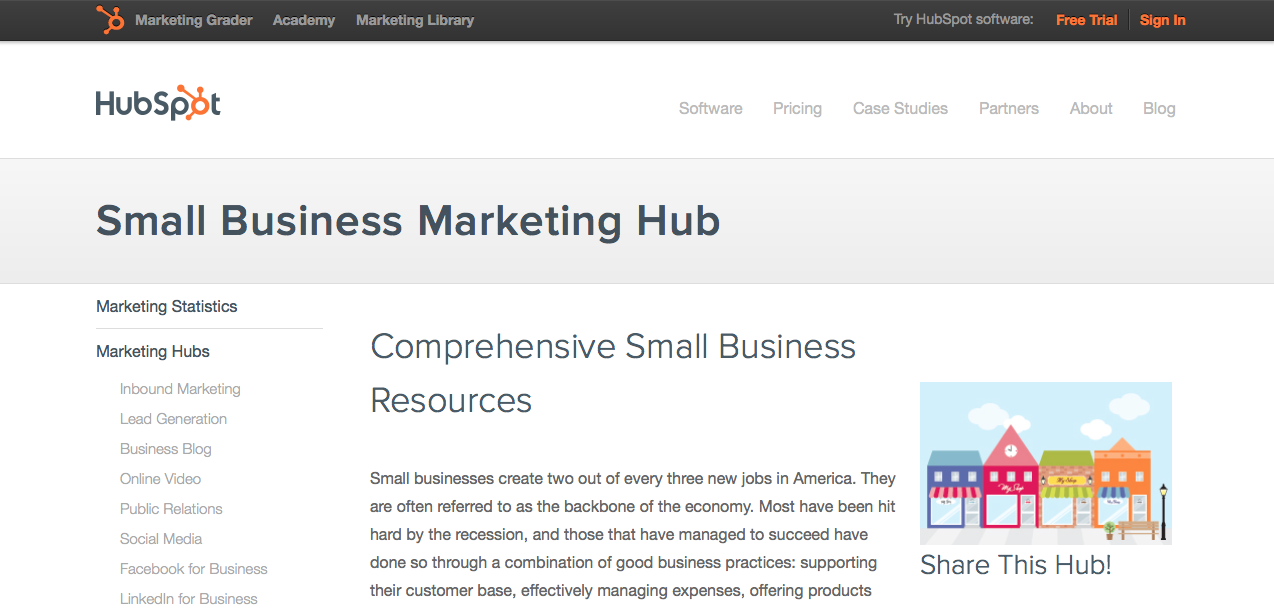
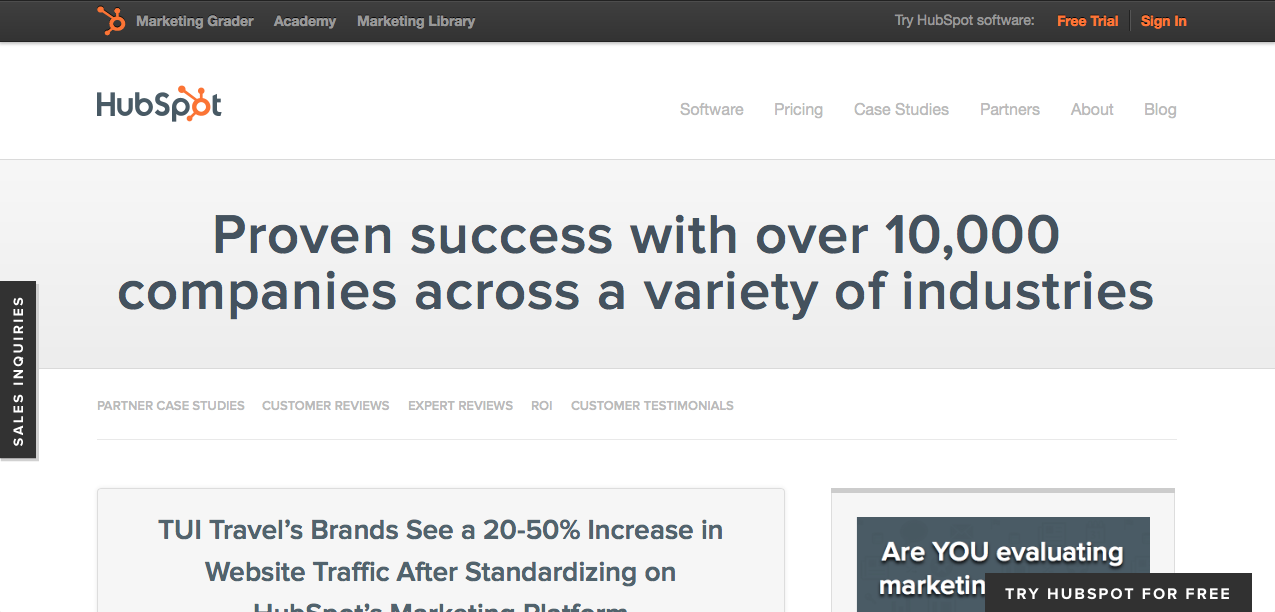
The first is clearly targeted to small business owners and marketers, while the second page is centered around value propositions for larger enterprise brands.
This can be taken even further with dynamic text replacement:
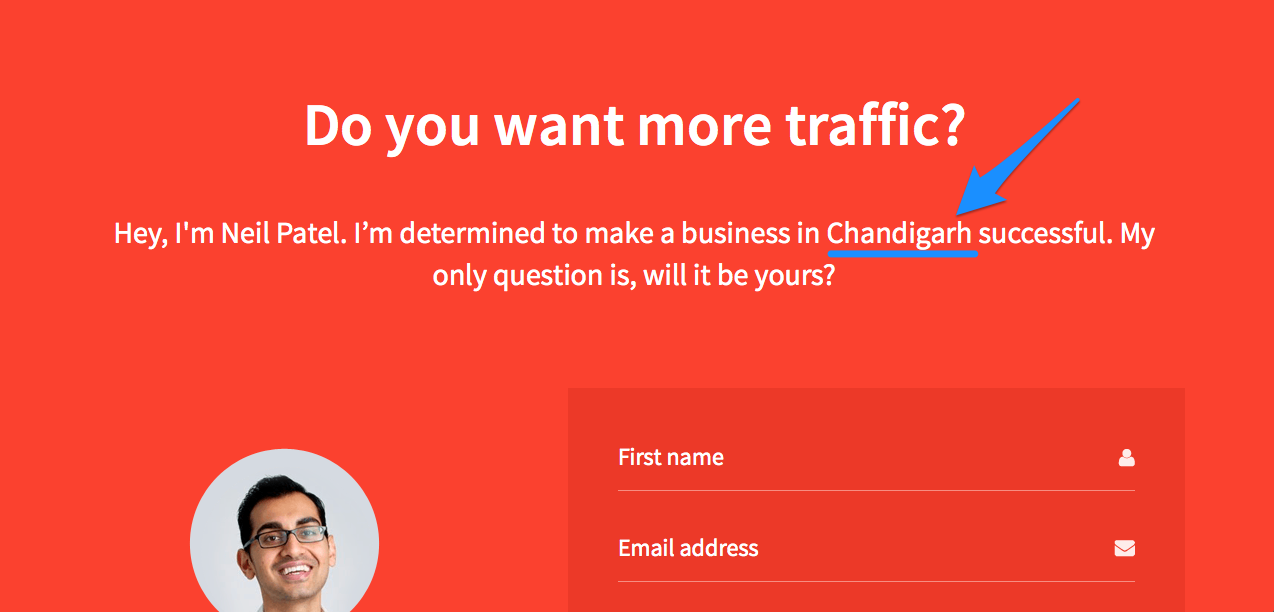
While brands are already using this, artificial intelligence will only make it easier to customize pages in order to tailor content to customer interests based on even more variables:
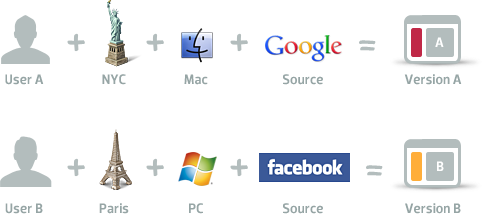
You'd be able to form a closer connection to the reader right off the bat by speaking directly to their interests. Would it surprise you to learn that this is already happening? If you're active on Facebook, you've probably even seen it:
Although the template was designed and animated by humans, the main content of these videos is programmatically selected by autonomous algorithms to engage individual users. One template can be used literally billions of times every day, but is still unique every single time.
Companies like Narrative Science are taking this even further by developing artificially intelligent writers that can create multiple versions of the same story targeted to different audiences.
Here's a sample they produced that covered a baseball game all the way back in 2011. It was completely machine written. Notice the embellished language in the piece that was shown to fans of the team versus the more neutral language for general readers:

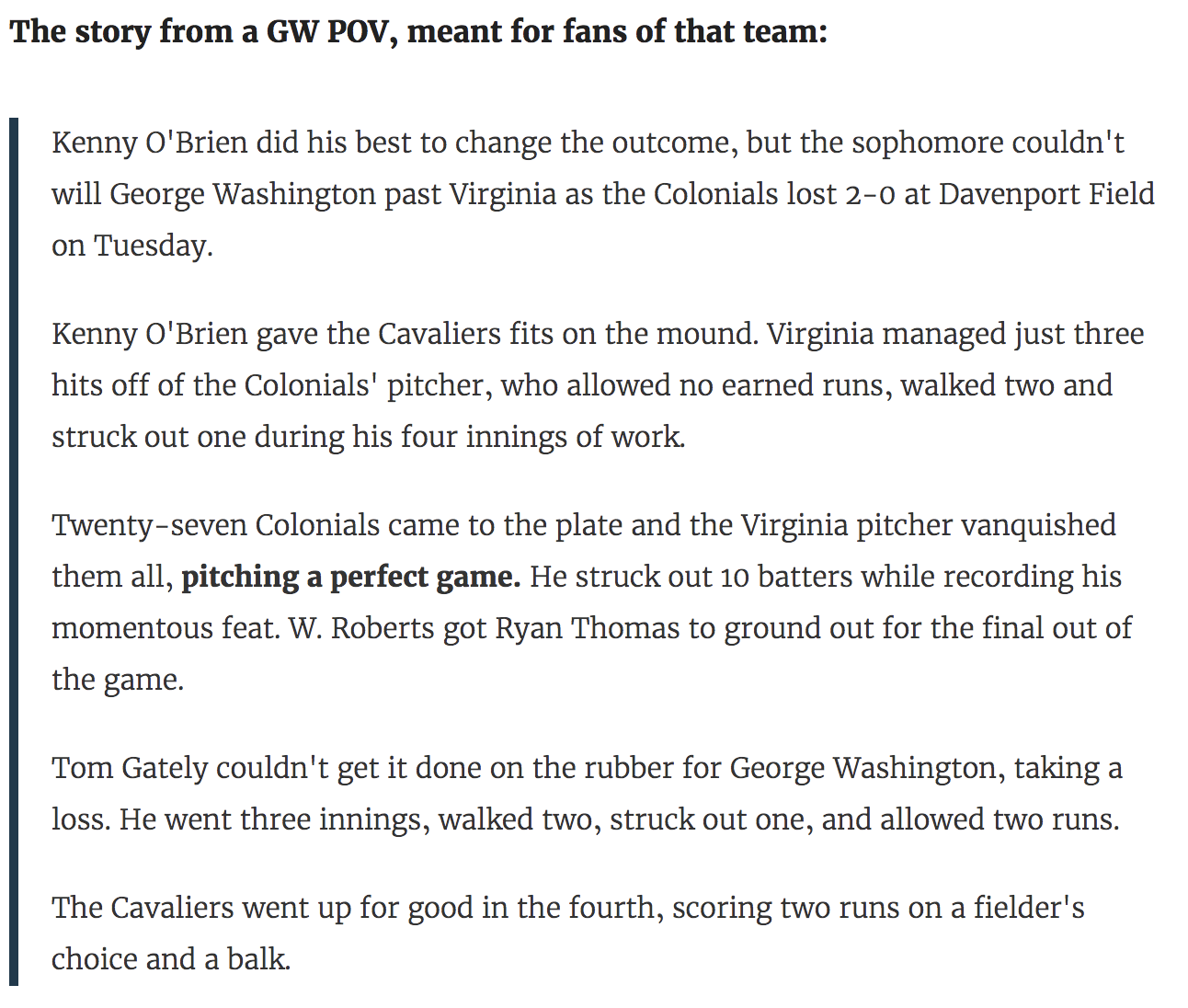
Related Content: How x.ai Came Up with the Idea for Amy the Personal AI Assistant [podcast]
This technology is still primarily used for sports and financial reporting for two main reasons:
But you can see how you can leverage computers to spin content with multiple angles for different audiences if you feed it the proper data. Obviously, this part of the technology will be well developed long before AI is composing content from scratch. But the idea of these two aspects combined is almost scary.
You'll need to keep a human editor on staff for a while, but computers will probably be doing the heavy lifting sooner than you might expect.
Free Bonus Download: Get your free 21-point on-page SEO checklist to help increase traffic and skyrocket your rankings! Click here to download it for free right now! ConclusionThe future of SEO might not be as far off as you think. Artificial intelligence is driving a new age of hyper-personalized content based on detailed data about your audience that previously wasn't possible.
Marketers who continue to rely on old-fashioned hacks and tricks will find themselves left in the dust as these algorithms get better at matching individuals to the content they want. But if you keep pace with technology and find ways to incorporate these innovations to create better content and strategy, you'll reap the benefits of a new age of content marketing, more powerful than ever before.
We help great companies grow their revenues Get Your Free Marketing Consultation


0 comments: